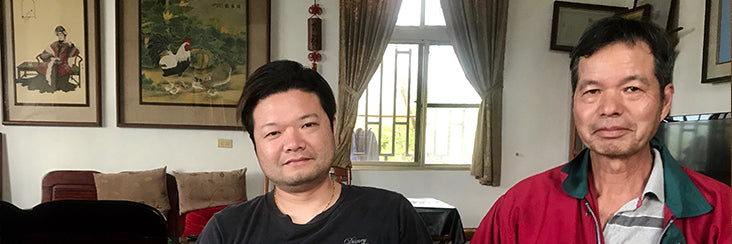
Honey Hong Shui Oolong Tea | Eco-Cha Tea Club

Qilin Lake in the photo above is a landmark that lies at the center of 3 small villages renowned for producing traditional Dong Ding Oolong Tea. Zhangya, Yonglong, and Fenghuang villages are the historical origin of Taiwan's most famous traditional tea making culture.
This month's batch #54 of the Eco-Cha Tea Club is a Honey Hong Shui Oolong Tea sourced from our friends who have provided our Dong Ding Oolong Tea and our Small Leaf Black Tea in recent years. They also made Batch #33 of the Eco-Cha Tea Club which we shared in August 2018. Batch #33 was similar to this month's batch in that they were both made with the help of the Green Leafhopper.
These two batches of tea also differ significantly, as each growing season has its own unique recipe in producing a crop of fresh leaf, including the timing and the extent that the leaves are "bug-bitten". The tea farmer must assess condition of the fresh produce upon harvesting, acknowledging the entire growing season, in determining how to cure a given batch of leaf.

Eco-Cha on the farm while Dad does the weeding and grooming by hand
The crop of new leaf growth that was made into this month's batch of the Eco-Cha Tea Club was affected by Green Leafhoppers in its early leaf bud stage. And when the farmer cut back the weeds between the rows of tea trees, the Leafhoppers dined solely on tea leaf buds after the other plants were removed. At this point, seeing the what the insects had already done to the crop, our friend decided to forego using any pesticides on this plot of tea, and let it grow naturally. So this crop new leaf was very stunted and gnarled by the time it was harvested, and it yielded a fraction of the norm for this season.
So, while Batch #33 was processed as a standard traditional Dong Ding Oolong, this month's batch was oxidized much more. This decision to push the oxidation was in response the fact that this crop of leaves had been severely affected by the Leafhopper and perhaps other natural influences. And whereas the bug-bitten factor was not even noticed in the flavor profile of Batch #33 until after it was roasted, this month's batch had a very noticeable honey-like note to it without any roasting at all. So this batch was left as is, following a brief, low-temperature "dry roast" to remove any remaining moisture in the leaves.

All the tea that we procure from this source was planted by the dad on the right in the photo above, and most of it was planted about 40 years ago. He boasts that his plants are still healthy and producing well as a result of his sustainable farm management. The most significant aspect of this claim is that has never used weed killers on the land he inherited, — despite the fact that these "foreign" products were ubiquitous some 30 years ago. This is one farmer who has never bought Roundup. We like him a lot, and he has been acknowledged as a respected traditional tea maker by his community.
Read about the tasting notes for this tea here!
LET US KNOW!
If you liked this article, please leave a comment in the comments section below or leave any questions you may have as well.
SUBSCRIBE!
If you enjoyed this post and would like to hear more about the specialty tea industry here in Taiwan, follow us on YouTube, Facebook, and Instagram and please subscribe to our newsletter. Subscribe now and get $5 off your first order!

